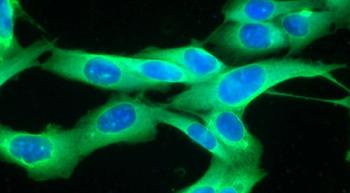
The FDA has granted a priority review to the pan-TRK inhibitor larotrectinib for the treatment of adult and pediatric patients with locally advanced or metastatic solid tumors with an NTRK gene fusion.

The FDA has granted a priority review to the pan-TRK inhibitor larotrectinib for the treatment of adult and pediatric patients with locally advanced or metastatic solid tumors with an NTRK gene fusion.

The FDA has granted a priority review to a new drug application for gilteritinib for the treatment of adult patients with FLT3 mutation–positive relapsed or refractory acute myeloid leukemia.

The FDA has granted a priority review to atezolizumab (Tecentriq) in combination with bevacizumab (Avastin), carboplatin, and paclitaxel for the frontline treatment of patients with metastatic nonsquamous non–small cell lung cancer (NSCLC).

The FDA has approved the use of the combination of the BRAF-inhibitor dabrafenib (Tafinlar) and MEK-inhibitor trametinib (Mekinist) for the treatment of patients with unresectable or metastatic BRAFV600E–positive anaplastic thyroid cancer (ATC).

The FDA has approved the chimeric antigen receptor (CAR) T-cell therapy tisagenlecleucel (Kymriah) for use in adult patients with relapsed/refractory large B-cell lymphoma—including diffuse large B-cell lymphoma (DLBCL), high grade B-cell lymphoma, and DLBCL arising from follicular lymphoma—after 2 or more lines of systemic therapy.

The FDA has approved the combined use of dabrafenib (Tafinlar) and trametinib (Mekinist) in the adjuvant setting for patients with BRAF V600E– or V600K–positive stage III melanoma following complete resection.

The FDA has granted a priority review to a biologics license application (BLA) for cemiplimab, a PD-1 inhibitor, for use in the treatment of patients with metastatic cutaneous squamous cell carcinoma (CSCC) or patients with locally advanced CSCC who are not eligible for surgery.

The FDA has granted a priority review for frontline use of the PD-1 inhibitor pembrolizumab (Keytruda) in combination with standard chemotherapy for patients with metastatic nonsquamous non–small cell lung cancer.

Adjuvant pembrolizumab reduced the risk of recurrence or death by 43% in patients with resected, high-risk stage III melanoma, results from phase III of the EORTC 1325-MG/KEYNOTE-054 trial showed.

The FDA has approved osimertinib (Tagrisso) for frontline use in patients with non–small cell lung cancer (NSCLC) who have EGFR-mutated tumors.

The FDA has granted priority review to a supplemental biologics license application for nivolumab (Opdivo) to be used to treat patients with small cell lung cancer who have already had two or more lines of therapy, and whose disease has continued to progress.

Significant improvements over chemotherapy alone makes frontline pembrolizumab (Keytruda) treatment a clear choice.

The FDA has approved the combination of immunotherapy drugs nivolumab (Opdivo) and ipilimumab (Yervoy) as a frontline treatment for patients with advanced renal cell carcinoma (RCC).

The FDA has granted a priority review to duvelisib for a full approval for the treatment of patients with relapsed/refractory chronic lymphocytic leukemia/small lymphocytic lymphoma (CLL/SLL) and an accelerated approval for the treatment of patients with relapsed/refractory follicular lymphoma.

The FDA has granted a priority review designation to dacomitinib for the frontline treatment of patients with EGFR-positive locally advanced or metastatic non–small cell lung cancer (NSCLC), according to Pfizer, the manufacturer of the pan-human EGFR tyrosine kinase inhibitor (TKI).

The FDA has granted blinatumomab (Blincyto) an accelerated approval for the treatment of adult and pediatric patients with B-cell precursor acute lymphoblastic leukemia (ALL) who are in remission but still have minimal residual disease (MRD).

The FDA has granted a breakthrough therapy designation to enfortumab vedotin to treat patients with locally advanced or metastatic urothelial cancer who previously received immune checkpoint therapy.

The FDA has granted a priority review to the combination of nivolumab (Opdivo) and ipilimumab (Yervoy) for the treatment of adult patients with microsatellite instability-high (MSI-H) or mismatch repair deficient (dMMR) metastatic colorectal cancer (mCRC) following progression on a fluoropyrimidine, oxaliplatin, and irinotecan.

Nilotinib (Tasigna) was approved by the FDA for the first- and second-line treatment of pediatric patients aged 1 year and older with Philadelphia chromosome–positive chronic myeloid leukemia in the chronic phase (Ph+ CML-CP).

The FDA has approved brentuximab vedotin (Adcetris) for use as a frontline treatment, in combination with chemotherapy, for adult patients with stage III or IV classical Hodgkin lymphoma.

Ribociclib (Kisqali) improves progression-free survival (PFS) in pre- or perimenopausal women with hormone receptor–positive, HER2-negative advanced or metastatic breast cancer. These results, shared at 2018 Miami Breast Cancer Conference, were sustained across patient subgroups.

The FDA has approved a supplemental biologics license application to add a 4-week dosing schedule for nivolumab (Opdivo) across several of the PD-1 inhibitor’s indications.

Based on data from the phase III MONARCH 3 trial, the FDA has approved abemaciclib (Verzenio) for use in combination with an aromatase inhibitor for the frontline treatment of postmenopausal women with hormone receptor (HR)-positive, HER2-negative advanced or metastatic breast cancer.

The FDA has approved durvalumab (Imfinzi) for the treatment of patients with locally advanced, unresectable stage III non–small cell lung cancer (NSCLC) who have not progressed following chemoradiotherapy.

Patients with nonmetastatic castration-resistant prostate cancer now have their first FDA-approved treatment. Apalutamide (Erleada) was approved based on the phase III SPARTAN trial in which apalutamide reduced the risk of metastasis or death by 72% in patients with nonmetastatic CRPC.

Based on impressive results from the phase III NETTER-1 trial, the FDA has approved Lutathera (lutetium [177Lu] oxodotreotide) for the treatment of patients with somatostatin receptor-positive gastroenteropancreatic neuroendocrine tumors (GEP-NETs).

Impressive overall survival (OS) data from the phase III ENDEAVOR trial inspired the FDA to approve a supplemental new drug application to add it to the label for carfilzomib (Kyprolis) for use in patients with relapsed or refractory multiple myeloma.

A supplemental biologics license application for the CAR T-cell therapy tisagenlecleucel (Kymriah) has been granted a priority review by the FDA for use in adult patients with relapsed/refractory diffuse large B-cell lymphoma (DLBCL) who are ineligible for or relapse after autologous stem cell transplant.

Based on results from the phase III OlympiAD trial, the FDA approved olaparib (Lynparza), a PARP inhibitor, for the treatment of patients with germline BRCA-positive, HER2-negative metastatic breast cancer who have previously received chemotherapy. HR-positive patients must also have had prior endocrine therapy.

The FDA has granted a breakthrough therapy designation to the combination of pembrolizumab (Keytruda), a PD-1 inhibitor, and lenvatinib (Lenvima), a VEGF/FGF inhibitor, for the treatment of patients with advanced and/or metastatic renal cell carcinoma (RCC).